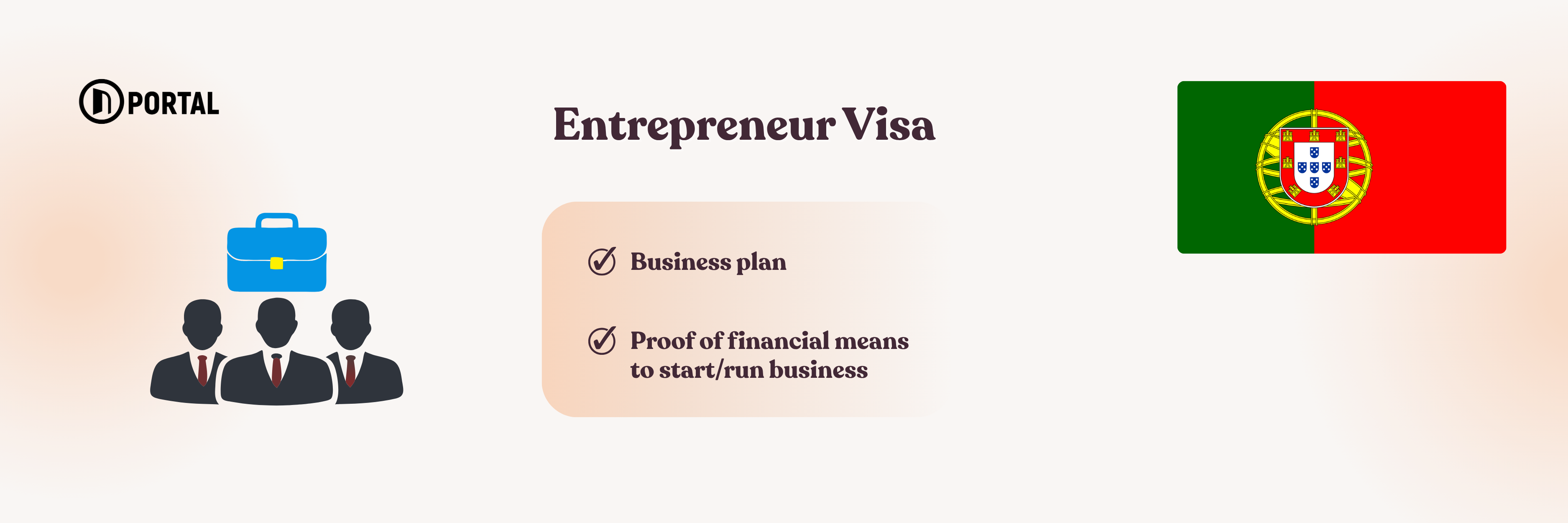
The Portugal Entrepreneur Visa, commonly known as the D2 Visa, opens the door for non-EU/EEA/Swiss nationals to live in Portugal while launching or expanding a business. It welcomes entrepreneurs, freelancers, and independent professionals who either bring a business to Portugal or actively invest in the local economy. This route offers a structured path from temporary residency to potential permanent residence or citizenship over time.
Non-EU/EEA/Swiss citizens wishing to start or continue a business in Portugal.
This includes entrepreneurs, freelancers, independent service providers, or those expanding an existing overseas business into Portugal.
Key Requirements:
Business Establishment or Planning
You must have either an active company in Portugal or intentions to establish one—with necessary financial proof or loan documentation.
Viable Business Plan
A well-structured plan showing economic, social, or cultural impact is essential.
Financial Sufficiency
No strict minimum investment amount, but €5,000–€50,000 is commonly considered realistic depending on the business.
Living funds required: At least the Portuguese minimum wage (~€9,870/year), plus 50% for a spouse and 30% per child.
Other Essentials
Age 18+, clean criminal record, valid health insurance, criminal record certificate, address in Portugal, Portuguese tax number (NIF), and bank account.
Residence & Work Flexibility
Obtain a 4-month entry visa, apply for a 2-year residence permit, which is renewable. After 5 years of legal stay, you can apply for permanent residency or citizenship.
Schengen Access
Enjoy visa-free travel within the Schengen area and permit entry across EU countries.
Family Inclusion
Eligible family members (spouse, children, parents) can receive residency rights too.
Local Benefits
You’ll have access to Portugal’s healthcare, education, justice system, and can work as a self-employed professional or employer.
Favorable Taxes
Through Portugal’s Non-Habitual Resident (NHR) regime, you may enjoy tax advantages—such as a flat 20% rate on Portuguese income and benefits on foreign income over 10 years.
Path to Citizenship
After five years of maintainable residency, you can apply for Portuguese citizenship. Language and integration requirements generally apply. Note that proposed changes may extend this requirement to 10 years.
An independent design consultant applies for a D2 Visa. They supply a strong business plan, proof of adequate funds, and legal incorporation of a Portuguese LDA. Placing their family in the application, they receive a four-month visa, convert it into a two-year residence permit, and reinvest in Portuguese growth. Over five years, they become eligible for permanent residency—and eventually, citizenship.
No. While there’s no official threshold, amounts between €5,000 and €50,000 are commonly seen as credible, depending on the business model. The key is that funding matches the venture’s needs.
You’ll need a passport valid for six months beyond visa, photos, criminal record certificate, proof of sufficient funds, health insurance, accommodation evidence, business plan, and company documentation (if already opened).
Consular decisions generally take 60 days. The total visa to residence permit transition can take 3–8 months.
Yes. Family reunification allows spouses, children under 18, dependent children over 18, and parents to receive residency rights.
Yes, requirements exist: spend at least 4 months in Portugal during your first year and at least 6 months in each subsequent three-year period to maintain residency.
Yes—after five years of legal residence, compliant with language and cultural integration requirements. Proposed law changes may extend this to 10 years.